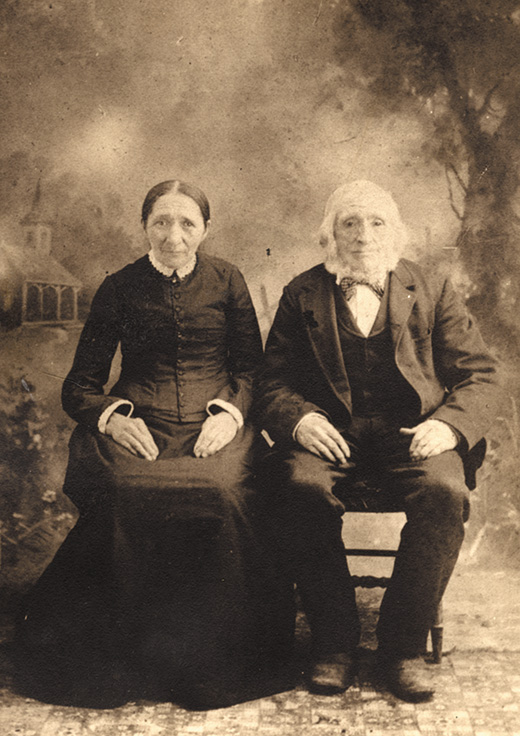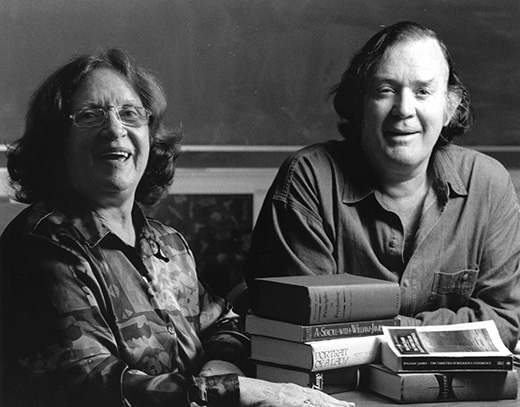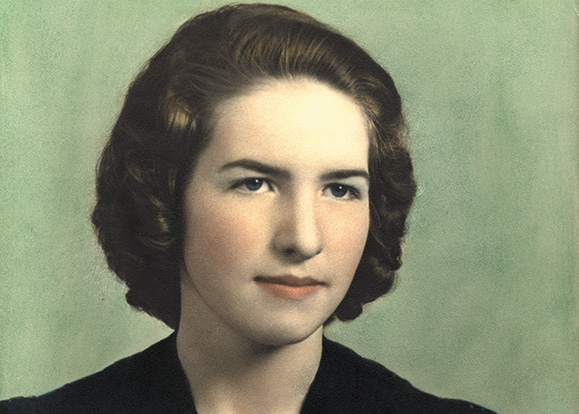From The Seven Little Foys to Patriot Games.
Once when I was a child, I asked my mother to let me dye my entire body green for St. Patrick’s Day. She refused, sensibly enough, or I would still be trying to scrub the food coloring from my fingernails. That memory tells me I must have had a strong enough desire to proclaim my Irish roots from an early age.
But those were the days when the “melting pot” ethos was dominant in America and it was not fashionable to take ostentatious pride in one’s ethnic background. We have come a long way since then, thanks in large part to an African American writer, the late Alex Haley, whose Roots made us all more aware of the need to pay homage to our ancestors.
I was named Joseph Pierce McBride after my maternal grandfather, Pierce Joseph Dunne, a miner and truckdriver in Idaho and Washington. My parents reversed my grandfather’s first two names for mine because he always had trouble with people thinking “Pierce” was his last name. I had my own problems with the name. One day when I was eight years old, my psychotic third-grade teacher, a nun who enjoyed locking me in the closet, called me before the class and asked what my middle name was.
Sensing that I was being set up for mockery and embarrassed to admit to what I thought was a strange-sounding middle name, I replied, “Peter.” Today, thanks to the Irishman playing James Bond, a kid would be proud to bear such a grand Gaelic name as Pierce, but I felt humiliated, not least because I had sheepishly denied my own ethnic identity.
Eventually I learned to take pride in my colorful and rebellious lineage. My mother, the former Marian Dunne, who worked as a Milwaukee newspaper reporter, was our family historian. But she was not always timely with her revelations, preferring to spin them out gradually, like an Irish-American Scheherazade.
As she recorded, the first of our family to emigrate from Ireland to North America, James Gavin of County Armagh, arrived in Newfoundland in 1820. After being conscripted into the British navy, he jumped ship when it docked in Newfoundland, assuming his mother’s maiden name, Carey, to avoid recapture.
Several of my ancestors worked as coal miners in Newfoundland and Idaho, and Pierce Dunne toiled in a silver mine. My great-grandfather Jimmy Dunne, an activist in the miners’ union during Idaho’s labor turmoil of the late 19th century, died of “miner’s con” (consumption) soon after my birth in 1947. When I took my first train trip to meet my mother’s family at the age of eight months, I was not allowed to see Grandpa Jimmy, but I did get to meet my great-grandfather Dominic Flynn, who delighted in teaching me how to spit. Two weeks later he was dead.
My mother’s family always had an acute awareness of political issues. She remembered sitting in front of her Grandpa Flynn’s radio during the 1928 presidential campaign and “listening, at age five, to the months and months of debate over whether a Catholic could be elected U.S. president. I was over there with them listening to the election returns, and I will never forget the tears trickling down the men’s cheeks – first-generation Irish Americans – as they learned that Al Smith had been defeated by Herbert Hoover.
“Like many other ethnic and religious groups then and now, they wondered if true equality would ever come; by then the Irish [Catholics] were OK, but not good enough to be president.” Grandpa Flynn did not live long enough to see John F. Kennedy elected president in 1960. But my mother and I worked in Kennedy’s campaign during the Wisconsin primary while she was vice chairman of the state Democratic Party.
My father, Raymond McBride, a newspaper reporter born in Superior, Wisconsin, had mostly Irish heritage, along with some French and Bohemian blood from his mother, Genevieve Garceau. The name McBride is Scottish, but it is derived from a cult devoted to St. Brigid who immigrated to Ireland in ancient times to practice their religion freely. My McBride ancestors began arriving in the U.S. during the mid-19th century. My great-grandfather Edward McBride, born in Iowa, traveled with his older brother to Nebraska in a covered wagon in 1881.
My grandfather John McBride reported a memorable incident that occurred during his father’s journey: “While camped for the night he and his brother were awakened by the barking of their dog. Getting up and walking out in the moonlight they came face to face with the Jesse James gang, a band of bank robbers who were on the move. The bandits’ only request was an exchange of horses as theirs were tired and spent. There was nothing else to do for the two startled young men but to comply. The exchange was made and it turned out to be a fair one as the horses they got were just as good, if not better than their own.
“Eventually they came to the tiny settlement O’Neill [Nebraska], founded by a hardy band of Irish folk headed by General John O’Neill, who led about twenty families from Pennsylvania.” In that wagon train was a 17-year-old girl named Hannah Gallagher, whose father had died in a coal mine accident. Hannah married Edward McBride and became my great-grandmother.
When I trace the evolution of my Irish consciousness, I realize that my life choices pushed me along that path, sometimes unconsciously. Among the strangest and most revealing experiences I had while working as a reporter for the Hollywood trade paper Daily Variety came in 1977 when I wrote the obituary of the legendary B-movie producer-director Bryan (Brynie) Foy. I did not realize at the time that he was my great-uncle.
As a child, Brynie was a member of the popular Irish-American vaudeville act The Seven Little Foys, who were celebrated in a 1955 film of that title starring Bob Hope as the paterfamilias, Eddie Foy, Sr. Shortly after I wrote Brynie Foy’s obit, my mother informed me that her Grandpa Flynn “was the eleventh of the twelve surviving children of Bridget Foy (sister of the vaudeville star Eddie Foy, Sr.) and Patrick Flynn, who emigrated from County Mayo, Ireland, and homesteaded on forty acres near Sauk Center, Minnesota.”

Luckily I gave Brynie an affectionate sendoff, although I couldn’t resist poking some fun at his bizarrely eclectic Hollywood career. Known as the King of the B’s, Foy directed the first all-talking film, Warner Bros.’ truly execrable gangster film Lights of New York (1928), and produced an early nudist documentary, Elysia (1934), with himself and his crew also nude behind the camera. He produced the blacklist-era feature I Married a Communist and the awful JFK biopic PT-109. Along the way Foy made a comedy-horror film with the wonderful title Sh! The Octopus. (Years later I was mortified to learn that Brynie was one of the people who advised RKO to cut 45 minutes from my favorite film, Orson Welles’ The Magnificent Ambersons.) My growing awareness of Irish history and culture was intensified by my fondness for the films of the great Irish-American director John Ford, the master of the Western genre, whose work I have been writing about since the late 1960s. But nothing brought my ethnic identity to the forefront more than the donnybrook over my 1992 review in Daily Variety of the Paramount film Patriot Games. I called it an “ultraviolent, fascistic, blatantly anti-Irish” adaptation of Tom Clancy’s novel, “a right-wing cartoon of the current British-Irish political situation.” History has borne out my assessment, but Daily Variety, which at the time was owned by a British publishing conglomerate, disowned me and my review after Paramount withdrew its ads from the paper.
I was gratified by the unanimous support of fellow journalists and critics who defended my First Amendment rights. I was also backed by Irish-American groups and many individuals of all backgrounds, typified by an anonymous man who left a heartening message on my voicemail: “Don’t let the bastards grind you down.” Most pleasing of all was Irish America naming me one of the top 100 Irish Americans of 1993 and editor Patricia Harty inviting me to write for this magazine.
In The Book of Movie Lists (1998), I wrote, “The quintessential romantic fantasy of every Irish-American male is to move to Ireland, buy a cottage in Connemara, and marry a woman who reminds him of Maureen O’Hara.” Imagine my consternation when I married an Irish woman named O’Hara who told me she hated The Quiet Man! Although people in Ireland get their Irish up over what they consider to be the movie’s corny ethnic stereotypes, while visiting the places where The Quiet Man was filmed in County Mayo with my new bride in 1985, I found that everybody there behaves exactly like a character out of The Quiet Man.
I married Ruth O’Hara after she came to Los Angeles to do graduate work in psychology at the University of Southern California, where she earned her Ph.D.; today she is an assistant professor at the Stanford University School of Medicine. Over the years we have had many spirited discussions about Ford films, and she now says she has come to like The Quiet Man a little.
Ruth’ s family, formerly of County Wicklow and now of the San Francisco Bay area, come from a proud Irish republican background, and my 16 years of knowing them have given me a much deeper understanding of Irish history and culture. Ruth’s late grandmother Sheila Smyth Harris joined the republican movement in 1919 after her 19-year-old brother Patrick, on his way home from serving Mass, was shot in the back by the Black and Tans. She was jailed for nine months during the civil war that followed the signing of the Anglo-Irish Treaty. When Mrs. Harris died in 1983, she was given a state funeral, complete with full military honors.
Ruth and her mother, Hetty, helped me research Ford’s roots in Spiddal, County Galway, for my forthcoming biography of the filmmaker. One blustery night outside the Spanish Arch in Galway, I was following the path of a Ford tracking shot in The Rising of the Moon when I tripped over an anchor that wasn’t seen on camera and almost fell backward into the Irish Sea.
Noel O’Hara, Ruth’s late father, had a lifelong fascination with American history and culture. His favorite films were Ford’s The Searchers and George Stevens’s Shane, and he was delighted to have family ties to someone whose great-grandfather had been robbed by Jesse James. One of Noel’s fondest memories was the time he and I went to see Shane at the Academy of Motion Picture Arts and Sciences Theater in Beverly Hills, where he was able to see the film’s reptilian bad guy, Jack Palance, in the flesh.

Noel provided invaluable advice and research assistance for my Ford biography. One of his scholarly coups was finding documentation to support Ford’s account of traveling to Ireland in December 1921 on the same boat with Michael Collins, who was returning from London with the draft of the Treaty for consideration by his colleagues in Dublin. I was delighted that Noel’s research helped me disprove British critic and filmmaker Lindsay Anderson’s patronizing description of this story as “typical Ford – poetically true, no doubt. ” As Noel wrote me, “It is a very colorful anecdote with republican overtones, or undertones, and will provide a nice little adventure in your account of Ford’s travels.” Noel spent many years as an electrical engineer and union representative on the board of directors of the Electricity Supply Board in Ireland, but he was at heart a man of letters. Early retirement allowed him to pursue his literary passions full-time. He did groundbreaking research on Irish American writers, parts of which were published in publications including the Los Angeles Times and the Recorder: A Journal of the American Irish Historical Society. He taught Irish and Irish-American literature at New College of California in San Francisco, as well as lecturing on his research to that city’s Irish Literary and Historical Society.
Gary Holloway, a past president of the society, called Noel “probably the finest Renaissance man I ever knew. He had a very devout following of people who just hung on his every word.” Daniel Cassidy, director of the Irish Studies program at New College, considered Noel “a man with tremendous soul and intellect, and that’s a rare combination. He was part poet, part academic, and part humorist. He had an incredible impact on his students at New College. If Noel had a mission in life, it was that of a man from Ireland who really had respect for the Irish diaspora. He had that kind of vision, a wide vision.”
Noel’s book manuscript In Pursuit of the Irish-American Writer, which I am now editing for publication, has expanded my own sense of what it means to be Irish-American. Describing his work as “a sort of literary travel book through Irish America,” Noel experienced America by following the trails of many of the country’s greatest writers.
With his generous, ecumenical perspective, Noel admired the stimulating, if often fractious, mixture of religious and ethnic cultures in the United States. What prompted him to begin writing the book was a 1989 article by Mary Gordon in the New York Times Book Review expressing astonishment that despite its rich literary tradition, Ireland had “produced so little in its American branch.” “The majority of the classic Irish writers whom Gordon named were Protestants,” Noel points out in the introduction to his book. “Yet when she shifted to the ‘American branch,’ she confined herself to writers who were or are Catholic. There was nothing unusual in this, for she was conforming to the apparently universal practice of only acknowledging Catholic Americans of Irish descent as Irish-Americans. But such a definitive statement by an American writer of renown, who has Irish ancestry herself, caused me to reflect on the truth of that universal perception.
“I had been fascinated by the United States since childhood, and Mary Gordon’s observations stayed on my mind, and in time gave me an excuse to view the country for myself, from the perspective of an Irishman who didn’t exclude any American with significant Irish ancestry, irrespective of religion, from the category ‘Irish-American.’ My adventure would be a way of looking at the United States on the ground, through the places, lives, and works of famous American writers with Irish ancestry.
“Certain writers seemed important to me because of the unique nature and impact of their work. Gore Vidal is unique as a writer who has written novels which span the whole history of the Republic. Edgar Allan Poe was the literary pioneer in so many ways, and Thomas Wolfe exemplified his own contention that Americans are exiles in their own land. Flannery O’Connor is the extraordinary Christian of American literature, whose fiction challenges the hegemony of science in our age. Margaret Mitchell is the outstanding talebender, and William Faulkner the foremost homesteader, the writer whose considerable number of masterpieces were written in and inspired by a postage stamp of soil in Mississippi. John Kennedy Toole is the serious comedian, the artist whose hilarity is an expression of his dismay at his own age. Raymond Chandler made literature out of mere detective stories, and Scott Fitzgerald is the misunderstood moralist who turned a tatty tale into one of the most beautiful novels in the English language.
“Eugene O’Neill created the first real tragedy in America, and so radically changed the theater in the United States. William Kennedy has probed the existential pain of being Irish in America, and in the process has identified a pathological past that needs to be buried as quickly as possible. No family of Irish provenance has made such a contribution to American writing as the Jameses from County Cavan. No American writer is held in higher regard than Henry James, and his brother, William, is the country’s most famous philosopher and psychologist. One of America’s most popular and enduring writers is John Steinbeck, whose masterpiece has a haunting and unique resonance with Irish history. Other writers would be encountered en route, some with Irish ancestry with whom I would linger a while…”
Noel O’Hara died unexpectedly in May of leukemia, which came as a terrible shock since he seemed so uncommonly vigorous for a man of 64. As I teach my own course on Irish and Irish-American literature and film at New College this fall, I know I can never replace Noel but am proud that by following his tradition and that of my Irish ancestors, I am able to “stand on the shoulders of giants.” ♦
______________
Joseph McBride’s biography Searching for John Ford will be published early next year by St. Martin’s Press and Faber and Faber. A revised edition of his 1992 biography Frank Capra: The Catastrophe of Success was published in September by St. Martin’s.


Leave a Reply